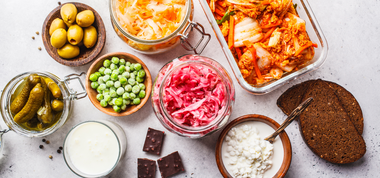Clif Bar vs. KIND Bar. It's a (snack) bar fight.

First there was beer – Budweiser calling out Coors and Miller for using corn syrup in their products. Now snack bars are amping up criticism of each other’s brands.
Recent Events in the Granola Bar Industry
Last month, in an open letter published in the New York Times, Clif bar challenged KIND, Larabar and RxBar to transition to organic ingredients. This month, KIND is pointing fingers at other brands for high sugar content as well as employing deceptive ingredient lists that split added sweeteners. As part of that accusation, KIND highlights that while the classic Clif Bar comes in at 31% sugar and an RxBar comes in at 25%, sugar makes up only 13% of a KIND bar by weight.
Puh-leez. Honestly, it's this sort of nonsense that propelled me to start Step One Foods.
Understanding Nutrition & Ingredient Panels
Nutrition panels miss a LOT about what a food delivers - and focusing just on the macronutrients (such as sugar) listed in that panel can be extremely misleading. For example, the nutrition panel for two apples and 16 gummy bears is pretty much the same - including the "high" sugar content - even though the effects of these foods inside our bodies are completely different.
What KIND is also not telling you is that it's actually being very selective in terms of which bars it chooses to compare. KIND's Mango Apple Chia bar (which boasts only 3 ingredients as a virtue) contains 21 grams of sugar (all of which comes naturally from the apples and mangoes). That 21 grams represents a whopping 60% sugar by weight - far higher than the competitors' bars KIND is demonizing. Ironically, I would consider this 3 ingredient bar one of the better KIND offerings, since it delivers some whole fruit in an unadulterated format.
KIND calling out ingredient splitting by its competitors is also a little ridiculous when many KIND products list sugar, glucose syrup, and honey in their ingredient panels.
Plus, sugar content, whether added or inherent, is only part of the story.
The Truth about KIND Bars & Fiber
For example, the bulk of the fiber in many KIND bars comes from inulin – an inexpensive short chain fiber additive derived from chicory root. It may be natural, and may contribute to the fiber content of the food, but the studies that laud the health benefits of eating a high fiber diet are based on fiber that is consumed as a natural part of whole foods. Some people can't even tolerate inulin because it's short chain structure makes it prone to fermentation in the gut, leading to uncomfortable digestive issues. At Step One Foods, we know that the source of the fiber matters just as much as the amount. It's why you will never see inulin in our foods.
What about Clif Bar’s Organic Ingredients?
On the flip side, just because the brown rice syrup (an added sweetener) in Clif bar is organic doesn’t make it any better for us than if it were conventional.
These tit-for-tat accusations are counterproductive, and don't help consumers one bit. They just add to the confusion around food and mostly represent marketing ploys. In the end, it’s the health result of eating something that matters the most - and neither Clif, nor KIND, RxBar or Larabar can point to a single study that used their products and delivered a measurable health improvement.
About Step One Foods Ingredients
At Step One Foods we understand the limitations of nutrition panels and consider the high quality and integrity of our ingredients a given. We exist because someone needed to rise above the hype and focus on real science and proven results – not just product buzz. Substance matters. After all, your health depends upon it.

Tested & Proven Results.
- Cardiologist formulated
- Supported by over 500 publications
- Clinically-proven, in a double-blind randomized trial with Mayo Clinic and The University of Manitoba
80% of participants lowered their cholesterol in just 30 days. With just two servings per day, Step One Foods offers a proven-effective way to naturally lower LDL (bad) cholesterol.
Get heart health tips and articles like this, delivered right to your email.
New articles every week.
You may also like...

You don’t need to avoid foods with cholesterol…except for these




